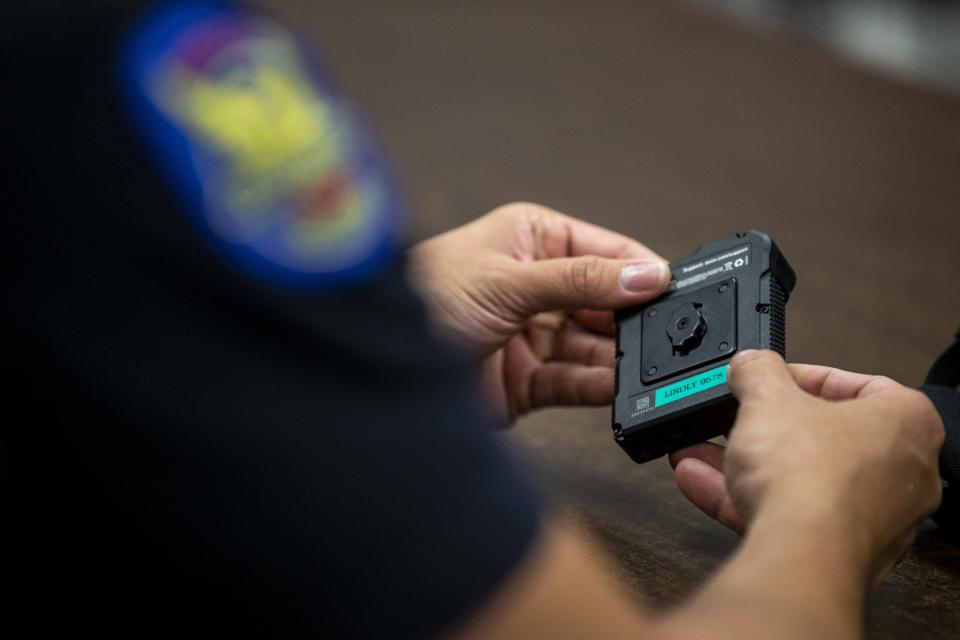One person pays hundreds, another zilch for the same police footage in Goodyear. Huh?
Goodyear recently jacked up its prices for anyone interested in purchasing police body camera footage, citing the need to offset the costs that come with redacting sensitive information from the footage.
Defense attorneys, researchers, insurance companies or regular people exploring legal claims all routinely request such footage.
Deputy City Attorney Anthony Polse explained to the Goodyear City Council in November that the process of redacting information is often a tedious one, also requiring specific equipment. The change came after the Legislature passed Arizona Revised Statute 39-129 last year, allowing local governments to implement a one-time hourly fee for people interested in obtaining body camera footage.

So, in Goodyear now, if there were 10 officers on one scene for an hour each and someone requested the body camera footage, the city would have to sort through 10 hours' worth of footage, with each hour of footage likely taking two to three hours to get through. Anything that could identify people involved would have to be redacted. Faces are also blurred as well as graphic footage.
The city was previously able to charge $25 per copy total with every requester paying the same fee but the new statute allows the city to charge $46 per hour spent on redacting information to recover some of the expenses, which includes time and equipment.
At $25 per copy, Goodyear already has one of the steeper charges in the Valley for body camera footage: Tempe and Mesa charge $10 per copy, while Phoenix charges just $4 per copy.
Polse said someone requesting 10 hours of footage may have to pay $1,000 depending on how long the redaction process takes. But after that, anyone requesting the footage will not have to pay for it since the redaction process only has to happen once.
When asked how many hours of footage most requests ask for, a Goodyear Police Department spokesperson declined to answer, saying an exact number cannot be given since it varies depending on the number of officers and how long the incident lasts.
But that won't apply to any victims involved in the crime, who will continue to receive the footage for free, Polse said.
That means that the first person or agency to request the video footage will have to pay the $46 per hour fee. But after that, any other requesters will only have to pay the cost of the hard drive or disk that they want the footage on.
The Police Department declined an interview request with The Arizona Republic.
In an email, a Goodyear police spokesperson said the city has gotten an average of 87 requests for body camera footage per month in the past year. However, the city declined to say if the majority of those requests are for the same crime scenes or different ones, making it unclear how much more money the city will make with the new fees.
"We cannot give a dollar amount since each body-camera video is a different length. It will also depend on the number of officers on scene. It varies based on the total amount of video there is to redact," wrote the Police Department spokesperson.
Gregg Leslie, professor and director of the First Amendment Clinic at Arizona State University's Sandra Day O'Connor College of Law, said the point is to cover the actual costs, which would only consist of the redactions on the first try.
Once those expenses are recovered, they can't be recovered again, which would be consistent with Arizona's public records act. That allows entities to recover their exact costs, which is why the first requester only gets charged.
Ordering a court transcript often costs a similar amount, where only the first requester pays while all future parties get it for free. While it might seem unjust, the city is allowed to recover those costs. It's a trend that's already starting to be seen in other cities, with Flagstaff City Council having recently voted to implement the same fees.
There also is technology that blurs faces and graphic images automatically, Leslie said. Some cities release those to the public and then charge a fee for the version that isn't pixelated.
"Any sophisticated system these days should automatically let you pixelate faces," Leslie said. So it might not be necessary to go through footage frame by frame with up-to-date technology.
Public records statutes vary from state to state. Some states and cities can even decide not to make body camera footage available at all. And those policies tend to be stricter during ongoing investigations or prosecution.
"I would love to see it be more of a constitutional right where you could go to the court and say 'no, this is important for the people to know how their police are performing. We have a right to know this,'" Leslie said.
Reach the reporter at ahardle@gannett.com or by phone at 480-259-8545. Follow her on X, formerly Twitter: @AlexandraHardle.
This article originally appeared on Arizona Republic: Goodyear OKs steep new fees for police camera records, but not for all

